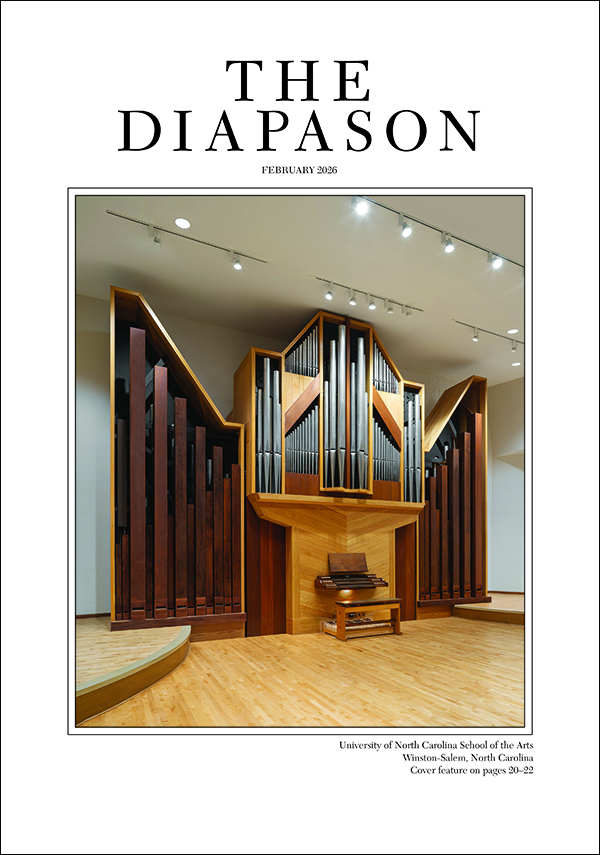
Notes in The Diapason: a bit of history
Siegfried Gruenstein, the founding editor of The Diapason, served for forty-eight years. The front-page tribute to him in the December 1959 issue celebrating the magazine’s fiftieth anniversary began with these descriptive words:
. . . a rare combination of competent organist and professional newspaper man, (Gruenstein) founded The Diapason in 1909 against the advice of his elders among organists, builders, and well-wishers. That it grew and prospered steadily under his guidance was due wholly to his skill, his impartiality, his integrity and his taste. . . . At first the principal purpose of the magazine was to represent the organ industry. However, it soon became evident that the organist and the organbuilder were so closely allied in their interests that the field should include both of them and that the paper would serve to bring the two more closely together.
In those early years the magazine expanded its focus in several directions, serving for a time as the official journal of the American Guild of Organists, for example. However, it was not until Frank Cunkle, Gruenstein’s successor, took over the supervision of the magazine that the organ’s sister instrument, the harpsichord, was welcomed into its pages. The first person to take charge of harpsichord matters was Philip Treggor (1920–2004) of Hartford, Connecticut, who published his first column in October 1967 (page 11). November’s column (page 13) featured the lute while a feature article by E. Power Biggs occupied the opposite page with his “Case for the Pedal Harpsichord.” Treggor’s three columns of interviews with Denise Restout, Wanda Landowska’s companion and legatee, presented valuable information about the pioneer harpsichordist’s biography and legacy (1968: March page 15, April page 23, May pages 14–15).
I had made my Diapason print debut five years earlier, in November 1962, when the magazine published the feature article “Hugo Distler—20 Years Later” based on research I was doing for my Doctor of Musical Arts thesis that I was busily writing while a student at the Eastman School of Music. My first guest contribution to Treggor’s column, published in June 1968, was “Isolde Ahlgrimm as the Widow Bach” (page 15), followed in October of the same year with my report on the second Bruges International Harpsichord Competition (pages 10–11). Meanwhile, in July 1968, Treggor’s column featured an interview with Boston-based composer Daniel Pinkham (page 8).
Treggor wrote an informative column about Arnold Dolmetsch’s collaborations with the Chickering Piano Company as they produced harpsichords and other early musical instruments (November 1968, page 12, with continuation in the December issue, pages 10–11), which proved to be his swansong, for he resigned from harpsichord column responsibilities at the beginning of January 1969.
During 1969 harpsichord news items were solicited from our readers, who were instructed to send them to the editorial staff of The Diapason. In May I submitted another feature article about Hugo Distler’s Harpsichord Concerto (pages 12–13), and in September 1969 an announcement and my picture appeared on page 25, with the information that, from henceforth, I would be “the man in charge of harpsichord items.” The following month my first column as harpsichord editor was published: “Praeludium, Allemande, and Courant: Some Notes on a European Summer” (page 12), and in December 1969 I relayed some corrections concerning the Huguenots and the city of Erlangen, as sent to me by Dr. Lowell G. Green of Boone, North Carolina, a reader who knew far more about such matters than I did. I was pleased to publish his corrections since that is how knowledge is disseminated.
So, depending on when one begins counting the years, I am either celebrating my fiftieth anniversary year as harpsichord editor or the fifty-seventh year since my first publication as a writer for this splendid magazine, which I have served by working with every editor except the founder, happy to have lasted even longer than Mr. Gruenstein, albeit with far fewer responsibilities. It will be my pleasure during 2019 to revisit some favorite pieces from this more-than-half-century collection of articles, as well as editing several guest essays, and, hopefully, sharing a few more original thoughts of my own.
2018 Harpsichord Notes: topics and page numbers
January, page 10: A posthumous gift from Gustav Leonhardt (Bach transcriptions published by Bärenreiter)
February, page 11: The Art of the Harpsichord (Two Texas Treasures: three-manual harpsichord by Keith Hill and Philip Tyre, miniature by Art Bell)
March, page 12: Handel with care (performance suggestions, recommended books, Handel House Museum, London)
April, page 10: Harpsichordist Jane Clark’s birthday
May, page 11: Seeking Haydn (new compact disc reviewed, some relevant research noted)
June, page 12: Dandrieu’s Harpsichord Music
July, pages 10–11: A glimpse into actual eighteenth-century performance practices (Beverly Jerold’s article, “Reichardt’s Review of Handel Concerts in London”)
August, page 10: Death and taxis in Vienna (Obituary of Gordon Murray), Review of Bach Violin/Harpsichord Sonatas CD (Pine and Vinikour), Communications from Readers
September, page 12: Armand-Louis Couperin Keyboard Works, edited by Martin Pearlman available for free download
October, page 14: A letter from Johann Sebastian Bach with two illustrations by Jane Johnson
November, page 16: Recent recordings of Bach’s Goldberg Variations by Diego Ares, Wolfgang Rübsam, and Helmut Walcha (from a boxed set)
December, page 11: Christmas gifts: a few suggestions (CDs, scores, books, and an anonymous Landowska caricature)

